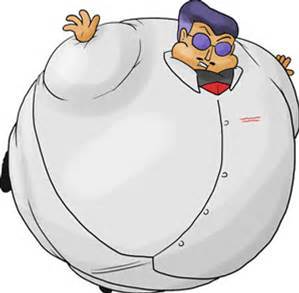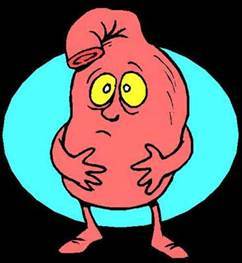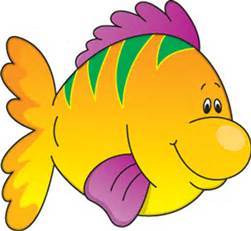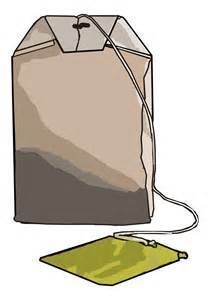Martha A. Cheves's Blog, page 17
July 5, 2016
Fruit Salad

Turn up that Fruit Salad by adding jello. I had 2 small containers of jello in the refrigerator and wanted to find a use for them before their expiration date. I had just made some citrus fruit salad and decided 'why not?' and cut it up, adding to to my salad. Delicious! Appealing to the kids! and Colorful!
Published on July 05, 2016 13:05
June 25, 2016
Gassiest Foods - Part 6 (End)

Sugar-Free Foods
Sometimes the thing that is giving us gas is something we have not paid any attention to. Many people do not know that a big gas-producer is sugar-free gum.
Many sugar-free food products contain sorbitol, which can be fermented by gut bacteria, resulting in unwanted gas. Read labels carefully when purchasing sugar-free gums, candy, and snack foods to ensure that they don't contain sorbitol.
Published on June 25, 2016 12:36
June 24, 2016
Gassiest Foods - Part 5

Gassiest Drinks
The following beverages may contain fructose, sorbitol, or carbonation, all of which can contribute to intestinal gas:
BeerFruit juices
Soda (regular and diet)
Published on June 24, 2016 12:38
June 23, 2016
Gassiest Foods - Part 4

Whole Grains
Although whole grains contain some helpful vitamins and are a source of dietary fiber, the soluble fiber content of some, as well as the presence of raffinose, a type of sugar, can create intestinal gas. Here are those to avoid when if you don't want to experience unwanted gassiness.
BarleyFlax seedRye
Wheat
Published on June 23, 2016 13:23
June 21, 2016
Gassiest Foods - Part 3

Gassiest Dairy Products
Even if you have not been diagnosed with lactose intolerance, you may find that eating dairy products results in unwanted gas. As our bodies age, we tend to produce less of the enzyme lactase that is necessary for digesting lactose (the sugar found in milk and other dairy products), and thus gassiness resulting from dairy foods may become a problem. Here are some dairy products to skip to avoid having gas:
ButtermilkCream cheeseHeavy creamIce creamMilkProcessed foods containing milk products
Ricotta
Published on June 21, 2016 10:52
June 20, 2016
Gassiest Foods - Part 2

Gassiest Fruits
The following fruits have a reputation for being gas-producing as they contain fructose, sorbitol and/or soluble fiber. Again, these fruits are good for you, so try to eat them on days when it is okay if you are a little gassier than usual.
Gassy Fruits:ApplesApricotsMangoOrangesPeachesPearsPlumsWatermelon
Dried fruits:ApricotsPrunes
Raisins
Published on June 20, 2016 07:36
June 19, 2016
Gassiest Foods - Part 1

This information came from a site titled Very Well. I just had to share.
Gassiest Vegetables and Legumes
The following vegetables are those most likely to give you gas due to the fact that they contain raffinose and/or fructose. Remember these vegetables are actually very good for you, so just avoid them on those occasions when you absolutely need to be gas-free.
Gassy Vegetables:ArtichokesAsparagusBroccoliBrussel sproutsCabbageCauliflowerCeleryOnionsPeasSweet potatoes
Gassiest Legumes:Baked beansBlack beansBlack-eyed peasButter beansCannelinni (white) beansKidney beansLima beansNavy beans
Published on June 19, 2016 15:44
June 17, 2016
What NOT to Say to Someone Dieting

This info comes from a site that I love. It was recommended to me by my doctor and is called My Fitness Pal. If you're like me you've heard most if not all of these said while dieting.
When someone in your life is in the process of losing weight, what should you do? Should you draw attention to the weight loss and applaud the person, or should you de-emphasize it and avoid talking about it? The knee-jerk reaction is often to compliment and praise people for how great they look and for all their hard work. But is hearing those things truly helpful?
As a registered dietitian nutritionist, I’ve worked with hundreds of people who have successfully shed pounds. To my surprise, many of them have related the same message: They don’t like it when people notice and talk about their weight loss. They don’t want to be complimented, praised or even have attention drawn to them. Instead of having every conversation revolve around their pants size, they want to talk about other things with their friends and loved ones.
For people on the sidelines wanting to show support and love, it can be hard to understand why someone wouldn’t want to hear words of encouragement. It can be challenging to put yourself in that position and understand how someone might misinterpret your well-intentioned comments.There are people who love to get positive comments and feedback about their weight-loss progress. Not everyone is sensitive to words of encouragement, but it’s more common than you’d think to have a negative reaction.
Let’s dive into the top five things you probably shouldn’t say to someone who is losing weight.
“How much more do you have to lose?” This is problematic because it assumes they couldn’t possibly be happy with where they are now. Different people have different weights at which they are comfortable, so who are we to judge?
“You probably don’t want to eat that, right?” Foods that are high in fat or sugar are often vilified. A person who is actively losing weight might have it built into their plan to enjoy or indulge in those foods occasionally. The last thing you want to do as a support in their life is increase food anxiety or induce guilt about eating certain things. Trust them, and don’t critique their food choices.
“You look so much better than before.” This is clearly not the most helpful thing to say to someone, but it does occasionally slip out of our mouths. Avoid comparing their appearance from before and after. Chances are, they’re already doing enough of that in their own head. If they want your opinion, they can ask!
“You’re just going to gain it back anyway.” This statement conveys a lack of confidence in your loved one’s ability to maintain weight loss and could be very discouraging to hear. It’s disheartening even if you meant it as a joke.
“Wow, you look so good!” This is the real kicker. People say this all the time and usually have nothing but good vibes they’re trying to send. This can be interpreted in many problematic ways, though. People often wonder what was wrong with them before or why everyone is noticing their body. This well-meaning statement can cause body-image issues to surface, which can — in the worst case — trigger an eating disorder.
Published on June 17, 2016 12:17
June 15, 2016
What's the Best Fish for You?

This is just part of an article I read on Sparkpeople. If you're a fish/seafood lover, you might want to read the rest of this article. It not only covers the omegas but also the contaminants, environmental concerns and gives you a general guideline for fish and your health. This is well worth going to this site to read.
What's the Best Fish for You?
Word is spreading that fish is good for your health , but like many matters of health and nutrition, there’s nothing simple about simply eating fish. Even though many varieties can be good for your health, contaminants such as mercury and polychlorinated biphenyl (PCB), found in many types of fish, may be detrimental to your health.
But it gets even more complicated. Beyond choosing fish based on healthfulness (considering things like abundance of healthy omega-3 fatty acids and low concentrations of mercury and contaminants), consuming fish also has an environmental impact. Many environmental advocates have reported that the mismanagement of many large-scale fishing operations has resulted in overfishing (and the plummeting of some wild fish populations). Fish farming, one alternative to wild fish, may help protect these populations, but other groups claim that fish farming has led to other problems, like the overuse of antibiotics to control disease.
Trying to keep track of which types of fish are healthy and safe—not only for you, but also for the environment—can be daunting, to say the least. And here’s why: Making the right choice when it comes to fish means looking for fish that have the highest nutritional content, lowest levels of contaminants, and, for those concerned with the environment, the lightest impact on the planet. Let's explore how to make the best choices to meet all of these tricky requirements.
Nutrition and Omega-3s
Nutrients found in foods are usually straightforward. When choosing fish, people generally want to know which types are highest in omega-3 fatty acids. Concerning omega-3s alone, the following chart ranks the omega-3s in fish from highest content to lowest.
Species
3 oz edible portion Grams
Omega-3 Mackerel, Atlantic 2.6 Chub 2.6 Herring 2.5 King Mackerel 2.2 Chub Mackerel 2.2 Trout, lean lake 2.1 Spiny Dogfish 2.0 Trout, lake 2.0 Salmon, Atlantic, farmed 1.9 Herring, pacific 1.8 Whitefish 1.8 Herring, Atlantic 1.7 Bluefin Tuna 1.6 Chinook Salmon 1.5 Sablefish 1.5 Albacore Tuna 1.5 Whitefish, lake 1.5 Sturgeon, Atlantic 1.5 Canned Sardines 1.4 Pink Salmon 1.0 Smelt 1.0 Striped Bass 0.8 Pollock 0.5 Catfish 0.5 Halibut, Pacific 0.5 Catfish or Cod 0.3 Flounder or Perch 0.2 Snapper or Grouper 0.2 Sole 0.1
Published on June 15, 2016 11:59
June 10, 2016
A Daily Cup of Tea and Your Health - Part 2 (End)

6. Tea may keep your smile bright"Japanese researchers have found that tea can decrease tooth loss," Ardine says. "It changes the pH in your mouth when you drink it and that may be what prevents cavities." Beyond that, tea, unlike many other beverages does not appear to erode tooth enamel, Bonci says.
7. Tea may boost the immune systemStudies have shown tea can tune up immune cells so they reach their targets quicker.
8. Tea may help battle cancerStudies on this are currently mixed, which means more research is needed, Bonci says. But, in the meantime, "if you've got a strong family history of cancer and you want to do anything you can, you might increase your tea consumption," she adds.
9. Herbal tea may soothe the digestive system"Herbal teas, in particular chamomile, can be good for people with irritable bowel syndrome because it is an antispasmodic," Bonci says. "And ginger teas can calm nausea."
10. Tea — unadulterated, that is — is calorie free
"It's a great no-calorie alternative to water," Bonci says. "It provides so many options for flavor and versatility. You can have it hot or cold. And you don't have to put anything in it, though you might want to add a cinnamon stick or some ginger. That means you're able to hydrate with something other than water alone."
Published on June 10, 2016 07:36



